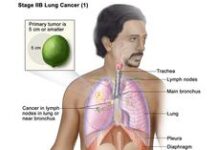
Lorraine, pictured with her nephew, was diagnosed with multiple myeloma in 2014 and has had to shield during the pandemic.
Sarah: “Before COVID-19 I would have heard something by now”
Sarah, aged 37, was diagnosed with bowel cancer that’s spread to nearby lymph nodes (stage 3) in 2018. She had surgery and 6 months of chemotherapy.

Sarah.
Since that initial surgery, Sarah has had a colostomy to allow her bowel to heal after the operation. Earlier this year, she was preparing for surgery to see whether it was possible to reverse the stoma.
“Even though I had successful surgery to remove the tumour from my colon after diagnosis, complications have meant that I’ve been in and out of hospital ever since. I was finally due to have the operation in March, 18 months after my treatment.”
But the COVID-19 outbreak put a stop to plans. “The night before my operation, I answered the phone to my surgeon. She told me that because many of their staff were isolating, they couldn’t carry out the procedure safely and had to postpone the operation.”
Sarah said it was worrying to be moved down surgery lists. “I know that waiting lists are made worse by the limited resources at my hospital and that everyone is waiting to get back to normal. I’ve been waiting for 2 years but I finally had my surgery at the end of July and will now need further procedures too.”
Eight weeks ago, Sarah learned that the surgery in July hadn’t been successful, and she would need a fourth operation. “I’ve heard nothing since. It’s hard to know if you are being further delayed by COVID-19, but I think that before COVID-19 I would have heard something sooner.”
Sarah says she understands the pressures people are under and is hugely supportive of the NHS, but it’s a worrying time. “My life is on hold and I worry about future knock-on effects.”
Hugo: “I did worry if it was the right thing, but I kept going”
In Feb 2020, Hugo felt a lump in his testicle.

Hugo was diagnosed with testicular cancer in February 2020.
Things moved quickly after that. Within a week, the lump had been removed and he had used a sperm bank to store his sperm. “A month later I started preventative chemotherapy, around the time the UK went into lockdown.”
The first week was 35 hours of chemotherapy in the hospital. “My older brother was also in hospital with COVID that week too. It was such a worrying time.”
Hugo found the experience incredible lonely, particularly as he couldn’t have anyone drive him to the appointments, as no-one knew the risks of COVID-19 at that time. “It was scary as, when I was 6, I lost my mother very suddenly to late diagnosis of cancer leaving a family of 4 children.”
Hugo said it was his choice to have the chemo, having decided to go ahead before the lockdown began. “I did worry if it was the right thing, but I kept going.”
While Hugo is through treatment now and has had a clear scan, being away from family, friends and colleagues during treatment was challenging. “I work in the city and was off work for two months, and I live on my own too, so it was a difficult time.
“I had amazing support from all the medical staff – I was so fortunate to be in their care and felt I was in the best hands possible. Their sole job is to do the best for individuals with cancer and, even despite the COVID pandemic, that hasn’t changed.”
Since finishing treatment, Hugo has been enjoying working out. “After 2 months of not being able to work out during treatment, I have upped my fitness and have since been back cycling, running and swimming.”
Lorraine: “I’m keeping my fingers crossed that my treatment will continue in the second lockdown”
“My employers have been very supportive during the pandemic. I am shielding at home and my manager wouldn’t even let me go into the office to collect my laptop, which had been left there when we went into lockdown.”

Lorraine.
Lorraine, who was diagnosed with multiple myeloma in 2014, says the pandemic has made her anxiety worse.” As someone who needs to shield due to being extremely vulnerable, I was terrified at first. I live alone but I do have family nearby and I have great neighbours which is just as well because I found it very difficult at first to get home deliveries.”
Thankfully, Lorraine’s treatment has continued during the pandemic. “I have my regular chemotherapy via a drip in hospital every month at Hammersmith Hospital and they have been amazing.” The only difference has been the treatment has been on a different ward than usual.
When shielding guidelines were relaxed in August, Lorraine was keen to remain cautious. “I felt that there was nothing I’d heard from any health agencies that made me feel that I would be safe going into the new normal.”
Being back in a national lockdown in England, Lorraine says it’s not made much of a difference as her behaviour hadn’t changed since March. “I’m more concerned about the second wave though, not just because of the projections but also because when I’m taking my walks, I’m seeing many people who are not observing social distancing. Lorraine says that despite what the media portrays, this behaviour she’s seeing isn’t from children or young people, “it’s from adults like me”.
She also worries about the effects of the pandemic for people who don’t have support mechanisms in place. “Or worse still, people who have had their treatment halted. I count myself so lucky that my chemo treatments have continued and I’m keeping my fingers crossed that this does not change during the second lockdown.”
Lori: “I’m so happy to be here for my children”

Lori with her children.
Lori was diagnosed with breast cancer in November 2019, aged 33.
“I was very healthy and exercised loads. I was a mum to Harry and Ella, who are 4 and 5, and was also a full-time master’s student and theatre maker.”
Lori went to GP after feeling more tired than usual. “I had a tiny lump that felt no different to the other lumps I had felt over the years. However, because my aunt had just been diagnosed with breast cancer, I decided to get checked.”
The GP wasn’t overly concerned with the lump but referred Lori for further tests at the hospital.
“They said they would call me with the results, but when they rang, they asked me to come in.”
It was breast cancer. “I was in total shock but also just so grateful to have followed my intuition that day and took the appointment. I felt a relief that I was married and have my two kids, and I kept thinking of all my friends and the upheaval this could bring to the lives of other women my age.”
Lori had surgery in November 2019 to remove the lump and started chemotherapy in January 2020.
“The chemo was the most brutal experience of my life. I was hospitalized three times feeling ill and then COVID came.”
Almost overnight, Lori’s support system was taken away. “I was feeling ill and then my kids were there all the time and needed home schooling. And my mum, who usually helped, couldn’t be there because of the restrictions.”
As she was so ill, the doctor suggested the option of not continuing the planned treatment. “They said that was the treatment regimen they used to give, and that it would only make 1% difference to my outcome. I agreed to the change.”
Lori had also been to have 15 radiotherapy sessions, but her doctors switched to giving the same amount over 5 days. She’s now on tamoxifen for 10 years.
“I had the results of a clear scan just before we went on holiday to Turkey in September 2020 – it was nice to get away after everything this year.”
And while she says she will never be the same person again, Lori’s now 4 months cancer free. “I’m so happy to be here for my children and ready to enjoy the rest of my life. I have so much gratitude for all the treatment the NHS has given me, as well as the various charities.” She’s in the process of applying for a PhD in theatre.
Tom Bourton is a media volunteer liaison manager at Cancer Research UK
Thanks to Sarah, Hugo, Lorraine and Lori for sharing their experiences with our Media Volunteer Liaison team.
If you would like to share your story with us, please visit our website. And if you have questions about cancer, you can talk to our nurses Monday to Friday, 9-5pm, on freephone 0808 800 4040.







